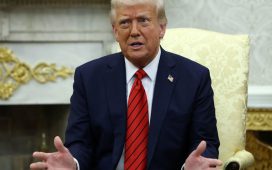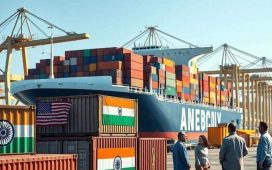
The hardening of interest rates had led to capital flowing back to developed nations.
“That was a period where one would have imagined a much deeper impact on the developing economies than what India witnessed, but the strength of demand in India, the strength of opportunities that people saw in India, ensured that we did not see the drastic fall that many of our other peer countries (witnessed),” Goyal said at the Global Business Summit on Friday.
India remains an attractive destination for investments.
“We continue to have significant FDI (foreign direct investment) coming in… a lot of reinvestment of earnings happened even during this period when ideally I would have thought global balance sheets were very stressed,” he said.
FDI equity inflows fell 24% in the first half of FY24 to $20.4 billion from the year earlier with Singapore being the top source followed by Mauritius.Goyal said it wasn’t “material” that India hadn’t matched the $71.35 billion of overseas inflows in FY23. “The material factor is that it (FDI) continues to come in. Very often when you see a very rapid growth on any statistic, you need some time for it to cool down also,” he said.Goyal said continuous and rapid growth of money flow sometimes is “very harmful” for an economy, “so I think India has been able to create a very fine balance in our control of inflation.”
He said India has seen 40-year lows of inflation at a time when countries have witnessed 40-year highs. The country’s average decadal inflation over the last 10 years of the Narendra Modi government has been the lowest India has ever seen in its history and that it has been a period of “tremendous fiscal stability, and today’s fundamentals of the economy will hold us in good stead”.
In August 2013, the rupee depreciated to nearly 68 to the dollar and the then government came out with a Foreign Currency Non-Resident Bank (B) or FCNRB policy to attract non-resident Indians (NRIs) to invest in the country.
“We give them almost 1.75-2% more than the market. We allowed NRIs to play the game of putting in 5-10% money of their own, borrow the rest from international banks… and artificially improved the rupee strength to make it about 56-57 to a dollar,” he said, adding that it may look as if the rupee depreciated from 57 to say 83 during the past 10 years, but the reality is that depreciation is from 68 to 83.
Empowerment
India took care of the basic needs of every single Indian, be it food, shelter, clean drinking water, or electricity in the past 10 years.
“These needs for years looked like a distant dream. I think this has been a period where the common man has been empowered,” he said.
Goyal said Uttar Pradesh is a classic example of transformation, from a BIMARU state to a most-favoured state. Through honest governance, UP has seen unprecedented growth, boasting decisive leadership, a skilled workforce, unmatched infrastructure, and developments in electricity, industrial parks, and tourism.
The fight against corruption is a principal focus, with notable successes in curbing graft in states like Telangana and Andhra Pradesh, he stated.
Modi’s innovative thinking has fueled various missions, leveraging criticism as a catalyst for improvement, he said, adding that over the next five years, the government looks at building an inclusive society by empowering the less privileged and giving them a rightful place in society.
According to Goyal, the government is characterised by an insatiable hunger for progress and an unwavering commitment to serve the 1.4 billion population and embracing new ideas and the administration encourages a culture of continuous improvement.
(You can now subscribe to our Economic Times WhatsApp channel)











